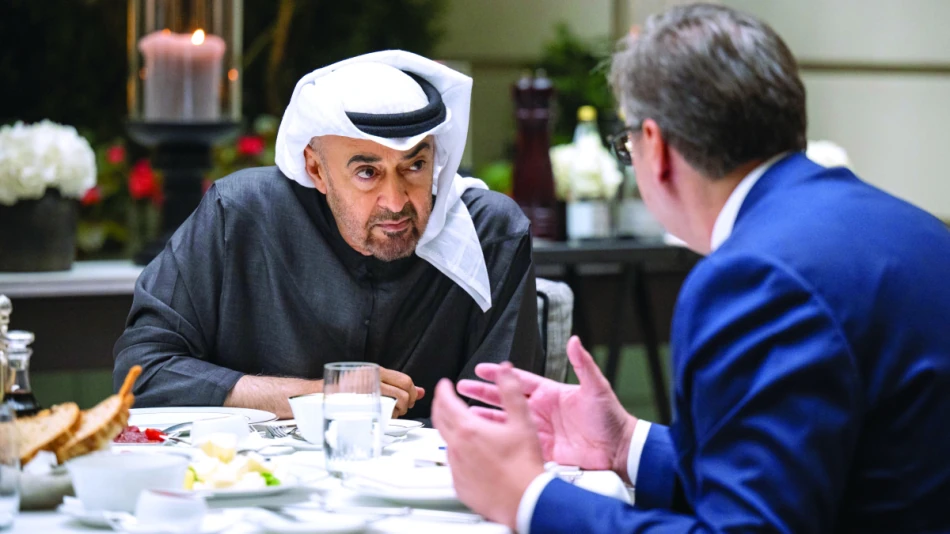
UAE President and Serbian Leader Discuss Bolstering Comprehensive Strategic Partnership in Belgrade
**UAE-Serbia Partnership Deepens as Sheikh Mohammed bin Zayed Visits Belgrade to Unlock Balkan Investment Potential**
The UAE is positioning itself as a key economic partner for the Balkans, with President Sheikh Mohammed bin Zayed Al Nahyan conducting a strategic working visit to Serbia to advance a comprehensive economic partnership agreement. The high-level talks with Serbian President Aleksandar Vučić focused on expanding cooperation across technology, renewable energy, food security, and trade—signaling the UAE's broader strategy to diversify its global economic footprint beyond traditional Middle Eastern partnerships.
Strategic Timing in a Shifting Global Economy
The UAE's intensified engagement with Serbia comes at a crucial moment when both nations are seeking to reduce economic dependencies and explore new growth corridors. For the UAE, Serbia represents a gateway to European markets and the broader Balkan region, which has emerged as an attractive destination for Gulf capital seeking stable, EU-adjacent investment opportunities.
During their Belgrade meeting, both leaders emphasized the importance of implementing their comprehensive economic partnership agreement, which positions Serbia as a potential hub for UAE investments targeting Central and Eastern Europe. This aligns with the UAE's "Operation 300bn" industrial strategy, which aims to triple the country's manufacturing output by 2031.
Beyond Oil: Technology and Renewable Energy Take Center Stage
The discussions highlighted sectors that reflect both countries' economic transformation ambitions. Technology cooperation and renewable energy featured prominently—areas where the UAE has been aggressively investing as part of its post-oil economic vision.
Serbia's relatively low energy costs, skilled workforce, and strategic location make it an attractive partner for UAE companies looking to establish European operations. The presence of Dr. Sultan Al Jaber, UAE's Minister of Industry and Advanced Technology, in the delegation underscores the technological dimension of this partnership.
Food Security: A Growing Priority
Food security discussions reflect a global trend where resource-rich nations are securing agricultural partnerships to ensure supply chain resilience. Serbia's agricultural potential, combined with the UAE's logistics expertise and capital, could create a significant food production and distribution network serving both regional and Middle Eastern markets.
Geopolitical Implications for the Balkans
Sheikh Mohammed bin Zayed's emphasis on peace and stability in the Balkans reveals the UAE's growing confidence in playing a constructive role in regional geopolitics. Unlike traditional great power competition in the region, the UAE's approach focuses on economic development and diplomatic dialogue.
This strategy mirrors successful UAE diplomatic initiatives in other regions, where economic partnerships have preceded and facilitated political cooperation. For Serbia, which maintains a delicate balance between EU integration aspirations and traditional ties with Russia and China, the UAE offers a politically neutral but economically significant partnership.
Investment Implications and Market Opportunities
The presence of Mohamed Alabbar, Chairman of Eagle Hills, in the UAE delegation signals potential major real estate and infrastructure investments. Eagle Hills has successfully developed projects across the Middle East and could bring significant capital to Serbia's urban development and tourism sectors.
For investors, this partnership indicates several emerging opportunities. UAE sovereign wealth funds and private companies are likely to increase their Balkan exposure, potentially creating new investment vehicles and partnerships accessible to international investors.
Comparing Regional Strategies
The UAE's Serbia engagement follows a pattern similar to its successful partnerships with Singapore and its growing ties with Central Asian nations. By focusing on practical economic cooperation rather than ideological alignment, the UAE has built a network of partnerships that serve its diversification goals while providing tangible benefits to partner countries.
This approach contrasts with more traditional great power strategies in the Balkans, where economic cooperation often comes with political conditions or geopolitical expectations. The UAE's model of "economic diplomacy" may prove more sustainable and attractive to Balkan nations seeking development without political complications.
Long-term Implications for Both Nations
For the UAE, Serbia represents a test case for its European expansion strategy. Success here could pave the way for similar partnerships with other Balkan nations, potentially creating a UAE-linked economic corridor from the Gulf to Central Europe.
Serbia benefits from accessing UAE capital markets, logistics networks, and connections to Asian and African markets where the UAE has established strong positions. This partnership could accelerate Serbia's economic modernization and provide alternatives to traditional European investment sources.
The comprehensive nature of this partnership—spanning technology, energy, agriculture, and trade—suggests both nations view this as a long-term strategic relationship rather than a transactional arrangement. As global economic patterns continue shifting, such partnerships between resource-rich Gulf states and strategically located European nations may become increasingly common and economically significant.
Most Viewed News

 Sara Khaled
Sara Khaled






